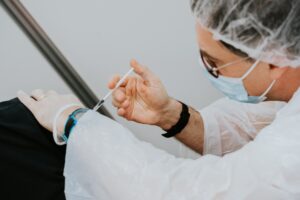Writer: Catie Schwartzman
 2 min read April 2021 — Floridians 18 years or older are now eligible for the COVID-19 vaccine. This signifies millions of people who can sign up for appointments and receive the vaccine. How is Tampa Bay handling this intense influx at its testing sites?
2 min read April 2021 — Floridians 18 years or older are now eligible for the COVID-19 vaccine. This signifies millions of people who can sign up for appointments and receive the vaccine. How is Tampa Bay handling this intense influx at its testing sites?
One adjustment in response to the restriction loosening was to further the distribution of the single-shot Johnson & Johnson COVID-19 vaccine as opposed to the Pfizer and Moderna vaccines, which both require two staggered doses. The Florida Division of Emergency Management (FEMA) announced that going forward, all their four vaccination sites across the state will transition to solely offering the Johnson & Johnson vaccine. While those who already received one of the other two vaccines at the sites, one of which is the Tampa Greyhound Track, will be able to get their second doses at the FEMA sites, any new vaccinations there will be single dose. The Greyhound Track, which originally offered Pfizer, will now allocate up to 3,000 Johnson & Johnson shots a day.
Similarly, pop-up sites across Tampa Bay are focusing their efforts on distributing the Johnson & Johnson vaccine. On Saturday, April 3, River Pines Apartments, Curtis Hixon Waterfront Park and Spring Hill Community Center offered solely Johnson & Johnson, the same as River Pines Apartments, Curtis Hixon Waterfront Park and Spring Hill Community Center on Sunday, April 4. Further pop-up sites will continue to offer Johnson & Johnson in the coming weekends.
These efforts come in part to increase accessibility to COVID-19 vaccinations across the Tampa Bay community. Some members of Tampa Bay, particularly immigrants and those in rural areas, have faced significant challenges in finding time for vaccination and in providing documentation for Florida residency. The language barrier for many segments of the community also poses an issue. Redlands Christian Migrant Association health advocate Noe Bautista worked to administer up to 400 vaccines to migrant farm workers in Mulberry at a clinic she helped organize.
“The first barrier is the lack of vaccines,” Bautista said to the Tampa Bay Times. “They don’t have access.”
Most pop-up clinics like Bautista’s are trying to be flexible with identification of residency proof to accommodate the vulnerable sectors. Dr. Nichelle Threadgill, Chief Medical Officer at Community Health Centers of Pinellas, Inc., is accepting any proof of residency that the Department of Motor Vehicles would accept.
“We try not to be restrictive at all,” Threadgill said to the Tampa Bay Times.
A segment of people most vulnerable to the residency requirement is the homeless population. Tampa Bay Street Medicine has distributed 93 vaccine doses in large part to homeless patients.
Distributing these vaccines en masse should be doable in the community: experts and local community site supervisors said they believe supply will be able to meet the expected demand, but that patience will be required to fulfill the expected demand from millions of people.
However, with free vaccinations regardless of whether the applicant has health insurance, makes getting vaccinated today a distinct and doable possibility for those 18 and over seeking a dose.
